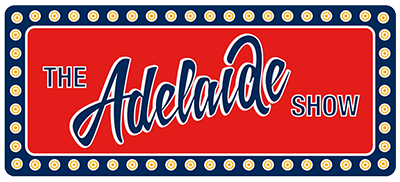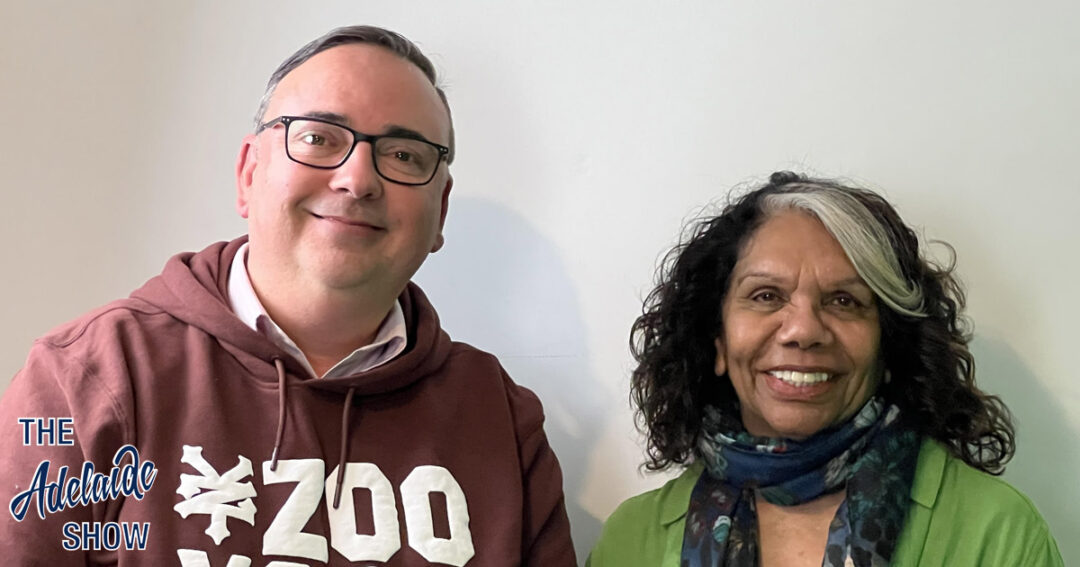Discover the Healing Centre for Griefology and explore The Seven Phases to Integrating Loss and Grief©
How has your understanding of and relationship with Australia Day changed over time? What goes through your mind when you hear a Welcome to Country or Acknowledgment of Country? And what do you think of when you hear the term Aboriginal prosperity? These are just some of the questions touched on in this extended interview with Griefologist, Rosemary Wanganeen, who takes us on a journey towards healing by embracing grief. As you’ll hear, there is important work to be done by Indigenous and Non-Indigenous Australians, and it starts with finding ways to forgive our 1788 ancestors.
And in the Musical Pilgrimage, Nataleigh shares a song produced as part of her 13-year-old songwriting competition, eMusic.
You can navigate episodes using chapter markers in your podcast app. Not a fan of one segment? You can click next to jump to the next chapter in the show. We’re here to serve!
The Adelaide Show Podcast: Awarded Silver for Best Interview Podcast in Australia at the 2021 Australian Podcast Awards and named as Finalist for Best News and Current Affairs Podcast in the 2018 Australian Podcast Awards.
And please consider becoming part of our podcast by joining our Inner Circle. It’s an email list. Join it and you might get an email on a Sunday or Monday seeking question ideas, guest ideas and requests for other bits of feedback about YOUR podcast, The Adelaide Show. Email us directly and we’ll add you to the list: [email protected]
If you enjoy the show, please leave us a 5-star review in iTunes or other podcast sites, or buy some great merch from our Red Bubble store – The Adelaide Show Shop. We’d greatly appreciate it.
And please talk about us and share our episodes on social media, it really helps build our community. Oh, and here’s our index of all episode in one concise page
Running Sheet: Loss, Grief, And Forgiveness: Rosemary Wanganeen On How Indigenous And Non-Indigenous Australians Can Thrive
00:00:00 Intro
Introduction
00:00:00 SA Drink Of The Week
There is no featured drink this week.
00:03:04 Rosemary Wanganeen, The Healing Centre for Griefology
Three weeks ago, at the end of May 2023, The Healing Centre for Griefology, shared a post that read: Did you know that 25% of Aboriginal people living in the inner city have mental health problems? We can change this – we can educate institutions and organisations about Griefology as a proven method to enact Aboriginal prosperity. It triggered an avalanche of comments like “looking for more handouts”, “the solution to Aboriginal prosperity is not different to Whites – get off the grog”, “easy fix, pack up the ‘dilly bag’ and go ‘walkabout’ and get out of the city, you all get paid by the government no matter where you go, and you will still get everything for nothing no matter where you go, so GET OUT OF THE CITY IF ITS MAKING YOU CRAZY”. When the founder and director of the Healing Centre for Griefology, Rosemary Wanganeen, shared how much hurt this caused her team, a flood of compassion arose from many people, including me, who just couldn’t process the vitriol the Centre had received. Rosemary Wanganeen Niina Marni (how are you)?
Some racist comments on a recent post by the Healing Centre for #Griefology has borne unexpected fruit; a deep conversation about #loss and #grief in #Australia through the lens of #aboriginal #Australians, with #Kaurna #Elder Rosemary Wanganeen. https://t.co/fENonNmNmr
— The Adelaide Show (@TheAdelaideShow) June 18, 2023
Rosemary, you are a Griefologist, a Clinical Loss & Grief Counsellor, today I want to delve into what griefology actually is, what The Seven Phases to Integrating Loss and Grief are, and your upcoming symposium on July 7, along with some discussion of the polarising views about Australia Day, my mixed feelings about Acknowledgement Of Country rituals in some circumstances, some insights about how to approach The Voice, and the buried art of intuition. But first I want to return to those spiteful, racist messages you and your team received.
My reaction was almost a carbon copy of everybody else’s. We were staggered by the unveiled hatred. One comment from anthropologist, Sue Fraser, summed it up by saying: I am so sorry that you and your team have to deal with these comments. It is sickening and sad that people believe these things, and that they think it’s okay to dump these comments on to someone like yourself who is doing such great work for Aboriginal Peoples and for the rest of us as well. Sending love and hugs Sue.
However, I think I have a deeper understanding of what was behind those comments, now that I have spent a few weeks listening to you talk. In particular, you shine a light on the psychotic state of the 1788 arrivals, explaining that they became perpetrators of violence having been victims of a broken approach to life that disconnected them from their humanity, in a process that stretches back to Plato and even beyond.
Can we please start here because I think your framing of this evolution might help us make sense of the macabre way Romans crucified people, the hideous human waste of The Great War, and even what’s happening today in Ukraine.
I’d like to dwell a little longer on Australia Day. My own journey over 50 years has been one of a little bit of “rah rah”, then many years of indifference (although the public holiday was gratefully received), to a stirred reflection on the “experiment” of South Australia, to growing conflict about how to process my growing understanding of some of the dark, dark stuff my ancestors did, to a point of being rather frozen now. That’s why my ears priced up when you mentioned, in a recent interview, the importance of you finding a way to forgive the 1788 arrivals, and the importance of us Anglo people finding a way to forgive them, too. Can you please expand on this?
The theme of forgiveness is key, here, but you do differentiate between grief forgiveness vs religious forgiveness. Can you explain this to me?
This reflection on words does raise the importance of both language and the process of passing on knowledge. In Sand Talk, Tyson Yunkaporta talks about Europeans named the mountains in the east as The Great Dividing Range, even though it doesn’t diving anything (it is, in fact, an song line that connects), and the coral off the east coast as the Great Barrier Reef even though it is not a barrier but in fact another song line that connects. Does this explain why there seems to be such a large gap between indigenous and non-indigenous cultures?
Something else Tyson shares in his book is the role of passing on knowledge through stories or yarns and how written words tend to be processed in short term memory but oral stories tend to get stuck into long term memory. As part of discussing this, it also brings up themes of the characters in Aboriginal stories – people, animals, plants, and even rocks and stars. He shared a story about a magpie and a crow that is still triggered every time I see one of those birds (it was part of a story about the importance of taking the learning of knowledge seriously) but I’ve also heard you tell a story about a meeting with Grandfather Crow. I’d love to understand this dynamic more.
We start our episodes with a simple acknowledgement of country and at the netball recently, there was a truly earnest and profound Welcome To Country that had gravitas and meaning. However, I see so many acknowledgement of country rituals that are either blurted out quickly as an inconvenience, or are made overly elaborate and hand-wringing in some theatre settings, that they come across as either hypocritical at one end or virtue signalling on steroids at the other end. What is your thinking about these rituals?
One of my clients was warned not to do an acknowledgement of country at an event for fear of offending people but as I learn more about griefology and the seven phases to integrating loss and grief, it seems that fear is because there is stuff bottled up inside many of us and it threatens to blow in harmful ways, or even just uncomfortable ways. Could we walk through these phases?
Phase 1 Contemporary Aboriginal Disadvantage
Phase 2 Childhood Violations / Losses & Unresolved Grief
Phase 3 Australian History; English History; Ancient History; Plato 388 BC.
Phase 4& 5 Ancient Traditional Culture
Phase 6 Reclamation of Contemporary Loss & Grief Programs
Phase 7 Develop Training Programs for every sector across society
I’m fascinated by your methodology for developing griefology. You talk about intuitive research. What does that mean and how can we be sure the voices we hear inside are not delusions?
Can you tell us about the National Symposium on Griefolology at the Adelaide Convention Centre. What it is, who should go, and what you hope it will achieve?
Steve references his documentary, Sorry Proof Country, during the interview. It was uploaded to YouTube many years ago when there was a 10-minute limit. So here is part one of the 30-minute film YouTube will guide you to parts two and three as you watch.
01:36:54 Musical Pilgrimage
Our featured song this episode is Here in the Woods, by Nataleigh.
Nataleigh is a dynamo on the local music scene. She performs all over place but also makes musical magic with her twin sister, Amanda, by hosting an annual music competition called eMusic. The twins invite friends to submit a song that follows three rules; each song has to be original, recorded at home, and meet the ‘general’ characteristics of the chosen genre. This year the genre is acoustic, but previous years it has been everything from power balads to children’s songs. There tend to be about six entries each year and then the 50 or so people who turn up vote on the songs so that a winner can be chosen.
The song we’re going to listen to is a good accompaniment to this episode. It’s called Here in the Woods. It was written by Amanda but both sisters sing it. It’s a good choice for this episode because part of what Rosemary Wanganeen was encouraging us to do was to get “into the woods” to reconnect to the stories from the land around us. And this song makes many references to immersing in and observing the woods, the forest, the moon, etc.
We wish them all the best for this year’s 13th eMusic competition – and thank you to Carol Neller for putting us in touch.
Here’s this week’s preview video
There was no preview video for this episode.
SFX: Throughout the podcast we use free SFX from freesfx.co.uk for the harp, the visa stamp, the silent movie music, the stylus, the radio signal SFX, the wine pouring and cork pulling SFX, and the swooshes around Siri.
An AI generated transcript – there will be errors. Check quotes against the actual audio (if you would like to volunteer as an editor, let Steve know)
When a transcript is available, it will be pasted here.

